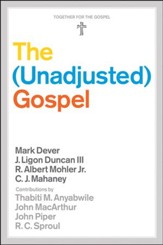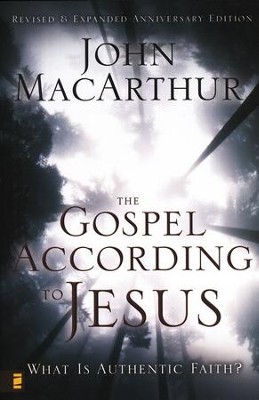Quotes about Gospel-True
We must first be careful to present the gospel clearly – God, man, Christ, response. God is our holy Creator and righteous Judge. All people have sinned against Him, both in Adam as our corporate representative, and in our own lives individually. That sin deserves eternal death – separation from God in Hell. But God sent Jesus Christ to die the death we deserved for our sin and reconcile us to Him. And He requires that we repent of our sins – turn away from them – and believe in Jesus Christ’s divine righteousness and substitutionary sacrifice. When we do – and only then – God credits us with Christ’s righteousness, and begins to bring our character into conformity with His holiness.
Altar Call Evangelism, ©9Marks. Website: www.9Marks.org. Email: [email protected]. Toll Free: (888) 543-1030.
I was a sinner, less perfect than God. By conviction of the Holy Spirit I learned that my condition would incur the eternal condemnation of God if I did not submit to His grace. I acknowledged myself a sinner and threw myself on His mercy and grace, recognizing that He had brought salvation to earth through His Son Jesus Christ. After God the Father put God the Son to death on the cross, He could proclaim grace and pardon to all who would submit to Him. I came to the cross, believed His promise about His Son, and God declared me righteous even while I was ungodly and gave me authority to become His child. I ceased to be a child of wrath and became a child of God, justified from all things. Simultaneously, I was declared to be an heir of God, joint-heir with Jesus Christ. I received eternal life, and shall never perish. I was accepted in the Beloved; my body became the temple of the Holy Spirit; I was born of the Spirit into the family of God, baptized by the Holy Spirit into the body of Christ, and sealed by the Holy Spirit unto the day of redemption. I have an inheritance incorruptible and undefiled and that fades not away, reserved in Heaven for me. Although I know myself to be a sinner, I am not concerned about the penalty for sin, since the Lord Jesus Christ bore the penalty and declared me righteous. The love of Christ becomes the constraining factor in my life, and I seek to glorify Him as Lord. I know Him as my Creator and so have peace of mind. I know Him as Savior and so have peace of conscience. In the measure that I enter into the second rest, I know Him as Lord and find the peace that passes all understanding.
The Gospel…is good news about Jesus Christ, the Son of God – about [who] He is and what He did. He is the Word “made flesh” (Jn. 1:14). It is He whom the Father sent “in the likeness of sinful flesh, and for sin” (Rom 8:3). He was lifted up (Jn. 12:32) and crucified – He died – He was buried – He rose again on the third day – He went up into heaven and sat down [at] the Father’s right hand (Eph 1:20) – He ever lives to make intercession for us (Rom 8:34). In these simple facts, which a child can understand, is contained the glorious Gospel of the blessed God.
Paul’s claim [was] that the message he preached was the authentic gospel of Christ. It is this: two things on which Paul pre-eminently insisted – that salvation was provided by God’s grace and that faith was the means by which men appropriated it.
Paul – Apostle of the Heart Set Free, Eerdmans, 1977, p. 102, www.eerdmans.com. Get this book!
The gospel is not a message about what we need to do for God, but about what God has done for us.
The Secret to Reaching the Next Generation by Kevin DeYoung taken from Don’t Call it a Comeback, edited by Kevin DeYoung, copyright 2011, Crossway Books, a division of Good News Publishers, Wheaton Illinois 60187, www.crosswaybooks.org, p. 29. Get this book!
The gospel offer of Christ includes all His offices, and gospel faith just so receives Him; to submit to Him, as well as to be redeemed by Him; to imitate Him in the holiness of His life, as well as to reap the purchases and fruits of His death. It must be an entire receiving of the Lord Jesus Christ.
What are the essential components of the gospel?
1. The character of God. The Bible describes God as holy (Ps. 99:3, 5, 9; Rev. 4:8), righteous (Ps. 11:7), just (2 Thess. 1:6), and perfect (Matt. 5:48). He hates sin and has nothing to do with it. In fact, He pours out His justified wrath on sin (Rom. 1:18; Eph. 5:6).
2. The character and nature of man. At the same time, the Bible describes man as having a sinful nature (Ps. 51:5), hopelessly separated from God. We are unable to please God in and of ourselves (Rom. 8:8). We have all sinned and fallen short of the glory of God (Rom. 3:23). We cannot save ourselves, and we deserve the wrath of God (Rom. 2:5).
3. God’s love for man. Yet despite our sinful ways, God has shown His great love for us (John 3:16; Rom. 5:8). In His mercy, He sent His Son, Jesus Christ, to die on the cross for us. On the cross Christ paid the full penalty for our sins and became the object of God’s wrath (2 Cor. 5:21).
4. Man’s response to God. If we confess and turn away from our sins and believe in Jesus Christ and the work He did for us on the cross, we can be saved (Mark 1:15; Rom. 10:9). If we possess faith to trust in God and the love He showed us through Jesus Christ, we are genuine Christians. We are justified – we receive forgiveness of our sins and are credited with Christ’s righteousness, Jesus’ life of perfect obedience (Rom. 3:24-27). In short, God restores our relationship with Him and adopts us into His family because of His grace and not because of anything we do (Gal. 2:16; Titus 3:5).
Growing Up Christian, P&R, 2005, p. 41-42. Used by Permission. Get this book!
Therefore, any genuine gospel proclamation must include an invitation to make a conscious decision to forsake one’s sins and come to Christ in faith, asking Christ for forgiveness of sins. If either the need to repent of sins or the need to trust in Christ for forgiveness is neglected, there is not a full and true proclamation of the gospel.
Systematic Theology, Zondervan, 1994, p. 695. Used by Permission.
Get this book!
Today, the pressure to fill auditoriums and services has driven many pastors to place the felt needs, or tastes, of the people above their duty to Christ. On every hand we hear of the Gospel being molded into a non-confrontative message intended to meet felt needs and impress the sinful heart. And, by most standards, this new philosophy of church life is working, as more and more auditoriums are filled with people hungry for a message that will affirm that they are actually on fairly good terms with the Almighty. But the biblical message is the message of the cross. It cuts right across the grain of the modern age’s preoccupation with pride, tearing down the façade and exposing the wretchedness of the human heart… Unfortunately, while the modern “un-gospel” may fill seats, it is the true gospel of sin and grace that is “the power of God unto salvation” (Rom. 1:16).
Appointed to Preach, Christian Focus Publications, 1999, p. 46. Get this book!
If one’s greatest problem is loneliness, the good news is that Jesus is a reliable friend. If the big problem is anxiety, Jesus will calm us down. Jesus is the glue that holds our marriages and families together, gives us purpose for us to strive toward, wisdom for daily life. And there are half-truths in all of these pleas, but they never really bring hearers face to face with their real problem: that they stand naked and ashamed before a holy God and can only be acceptably clothed in His presence by being clothed, head to toe, in Christ’s righteousness.
A ministry which is weak and flabby on the subject of sin is a useless ministry. A preaching ministry that does not result in conviction of sin is useless. If it does not wound, how can it heal? The good news is only for sinners.
Penal substitution does not turn God into a cosmic child abuser. It does not reduce Christ to the passive victim of some divine injustice. It does not pit the Trinity against itself. No, in the God-forsakenness of Christ on the cross, the love of God and the justice of God are revealed on our behalf. United in purpose, Father and Son act in concert to save God’s people. The sinless Son of God bears our sin, and then God pours out the wrath that our sin deserves, and Jesus the Son endures it so that we, who deserve that wrath, might never encounter it. This is the gospel, the good news of the cross, and it calls us to forsake our sin, to turn away from it and embrace Christ, the forsaken one, so that we may not be forsaken.
Forsaken by Mark Dever and Michael Lawrence taken from It Is Well, by Mark Dever and Michael Lawrence, copyright 2010, Crossway Books, a division of Good News Publishers, Wheaton Illinois 60187, www.crosswaybooks.org, page 90.
Here’s the [Gospel] message in four parts:
1. God, who is perfectly holy, just, and good, created us to display His glorious character and rule.
2. We rebelled, choosing to display our own glory and follow our own rule, earning God’s just wrath against such sin.
3. God sent His Son to reestablish God’s rule by living the perfect God-imaging life, dying on the cross to pay the penalty for God’s wrath against sin, and rising in victory over sin and death.
4. We are now called to repent of our sinful self-rule, confess Jesus as Lord, put our trust wholly in His finished work on the cross, and live the obedient and free life He means for us to live.
There are only two ways that you can believe you can come to God; either on the merits of Christ or on your own merits. It’s either by grace and grace alone or it’s by works or some mixture of grace and works. It’s only two things. There’s only two kinds of religion in the world. The religion of divine accomplishment, the religion of human achievement, Christianity, the true gospel is the religion of divine accomplishment: God does it all, you simply believe. Every other religious system in the world is a religion of human achievement.
Christ Creates Conflict in the Synagogue. The sermon originally appeared (https://www.gty.org/library/sermons-library/42-182/christ-creates-conflict-in-the-synagogue) at www.gty.org. © 1969-2008. Grace to You. All rights reserved. Used by Permission.
This, then, is the gospel we are to proclaim: That Jesus Christ, who is God incarnate, humbled Himself to die on our behalf. Thus He became the sinless sacrifice to pay the penalty of our guilt. He rose from the dead to declare with power that He is Lord over all, and He offers eternal life freely to sinners who will surrender to Him in humble, repentant faith. This gospel promises nothing to the haughty rebel, but for broken, penitent sinners, it graciously offers everything that pertains to life and godliness (2 Peter 1:3).
No man is interested in a piece of good news unless he has the consciousness of needing it; no man is interested in an offer of salvation unless he knows that there is something from which he needs to be saved. It is quite useless to ask a man to adopt the Christian view of the gospel unless he first has the Christian view of sin.
Three main tendencies that can draw our hearts away from the centrality of the gospel:
1. Legalism, which means basing our relationship with God on our performance.
2. Condemnation, which means being more focused on our sin than on God’s grace.
3. Subjectivism, which means basing our view of God on our changing feelings and emotions.
The Cross Centered Life, 2002, Used by permission of Sovereign Grace Ministries, p. 22-23.
Redemption. This was promised in the Old Testament, but was fulfilled with the coming of Christ, fully God and fully man, who lived a sinless life and went obediently to suffer death on a cross, dying in our place. God saves us by accepting the substitutionary sacrifice of Christ as full payment for the penalty of sin, and He raised Christ from the dead on the third day, announcing to all the vindication and completion of the Son’s saving work. Salvation is declared to all who believe on His name and confess Him as Savior and Lord.
The Conviction to Lead, Bethany House Publishers, 2012, p. 41, Used by Permission.
Get this book!
A preaching of the gospel that calls men and women to accept Jesus as their Savior but does not make it clear that discipleship means a commitment to a vision of society radically different from that which controls our public life today must be condemned as false.
There was no “easy believism” in Paul’s presentation of the Gospel. Decision was to be accompanied and followed by devotion. Jesus Christ IS Lord and, therefore, MUST be Lord in our lives.
We are not encouraged to forsake our sin by having our senses amused or our preferences coddled. The Gospel is inherently and irreducibly confrontational. It cuts against our perceived righteousness and self-sufficiency, demanding that we forsake cherished sin and trust in someone else to justify us. Entertainment is therefore a problematic medium for communicating the Gospel, because it nearly always obscures the most difficult aspects of it – the cost of repentance, the cross of discipleship, the narrowness of the Way. Some will disagree, arguing that drama can give unbelievers a helpful visual image of the Gospel. But we have already been given such visual images. They are the ordinances of baptism and the Lord’s Supper and the transformed lives of our Christian brothers and sisters (Mark Dever and Paul Alexander).
Doing Responsible Evangelism, taken from The Deliberate Church, © 2005, Crossway Books, a division of Good News Publishers, Wheaton Illinois 60187, p. 55, www.crosswaybooks.org.
Religion says, “Attain”; the gospel says, “Obtain.” Religion says, “Attempt”; the gospel says, “Accept.” Religion says, “Try”; the gospel says, “Trust.” Religion says, “Do this;” the gospel says, “It is done” (John T. Seamands).
Taken from: Tell It Well: Communicating the Gospel Across Cultures by John T. Seamands, © 1981, p. 70, Used by permission from Beacon Hill Press.
So what are the essentials of [the Gospel]? We can sum them up in four words: God, man, Christ, and response.
1. God is our holy Creator and righteous Judge. He created us to glorify Him and enjoy Him forever (Gen. 2:7, 16-17; 18:25; Matt. 25:31-33).
2. But mankind has rebelled against God by sinning against His holy character and law (Gen. 3:1-7). We’ve all participated in this sinful rebellion, both in Adam as our representative head and in our own individual actions (1 Kings 8:46; Rom. 3:23; 5:12, 19; Eph. 2:1-3). As a result, we have alienated ourselves from God and have exposed ourselves to His righteous wrath, which will banish us eternally to hell if we are not forgiven (Eph. 2:12; John 3:36; Rom. 1:18; Matt. 13:50).
3. But God sent Jesus Christ, fully God and fully man, to die the death that we deserved for our sins – the righteous for the unrighteous – so that God might both punish our sin in Christ and forgive it in us (John 1:14; Rom. 3:21-26; 5;6-8; Eph. 2:4-6).
4. The only saving response to this Good News is repentance and belief (Matt. 3:2; 4:17; Mark 1:15; Luke 3:7-9; John 20:31). We must repent of our sins (turn from them and to God) and believe in Jesus Christ for forgiveness of our sins and reconciliation to God (Mark Dever and Paul Alexander).
Doing Responsible Evangelism, taken from The Deliberate Church, © 2005, Crossway Books, a division of Good News Publishers, Wheaton Illinois 60187, p. 51-52, www.crosswaybooks.org.
The nature of Christ’s salvation is woefully misrepresented by the present-day evangelist. He announces a Savior from hell rather than a Savior from sin. And that is why so many are fatally deceived, for there are multitudes who wish to escape the Lake of Fire who have no desire to be delivered from their carnality and worldliness.
Christ is never fully valued, until sin is clearly seen. We must know the depth and malignity of our disease, in order to appreciate the great Physician.
I do not believe that any man can preach the gospel who does not preach the law. The law is the needle, and you cannot draw the silken thread of the gospel through a man’s heart unless you first send the needle of the law to make way for it. If men do not understand the law, they will not feel that they are sinners. And if they are not consciously sinners, they will never value the sin offering. There is no healing a man till the law has wounded him, no making him alive till the law has slain him.
Avoid a sugared Gospel as you would shun sugar of lead. Seek that Gospel which rips up and tears and cuts and wounds and hacks and even kills, for that is the Gospel that makes alive again. And when you have found it, give good heed to it. Let it enter into your inmost being. As the rain soaks into the ground, so pray the Lord to let his Gospel soak into your soul.
I do not believe that we can preach the gospel if we do not preach justification by faith, without works. Nor unless we preach the sovereignty of God in the dispensation of grace. Nor unless we exalt the electing, unchangeable, eternal, immutable, conquering love of Jehovah. Nor do I think we can preach the gospel, unless we base it upon the particular redemption which Christ made for His elect and chosen people. Nor can I comprehend a gospel which lets saints fall away after they are called.
If sin is not our core problem, the gospel itself – the thing of first importance – is marginalized. The good news that Jesus proclaimed and offered is that there is forgiveness of sins, not through our own attempts to please God but by placing our confidence in Jesus Himself, in His death and resurrection. If sin is not our primary problem, then the gospel of Jesus is no longer the most important event in all of human history.
Addictions – A Banquet in the Grave, P&R Publishing, 2001, p. 21, Used by Permission. Get this book!



























